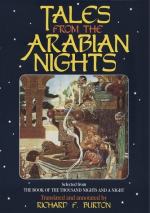[FN#153] Here begins the Sindibad-namah, the origin of Dolopathos (thirteenth century by the Trouvere Harbers); of the “Seven Sages” (John Holland in 1575); the “Seven Wise Masters” and a host of minor romances. The Persian Sindibad-Namah assumed its present shape in A.D. 1375: Professor Falconer printed an abstract of it in the Orient. Journ. (xxxv. and xxxvi. 1841), and Mr. W. A. Clouston reissued the “Book of Sindibad,” with useful notes in 1884. An abstract of the Persian work is found in all edits. of The Nights; but they differ greatly, especially that in the Bresl. Edit. xii. pp. 237-377, from which I borrow the introduction. According to Hamzah Isfahani (ch. xli.) the Reguli who succeeded to Alexander the Great and preceded Sapor caused some seventy books to be composed, amongst which were the Liber Maruc, Liber Barsinas, Liber Sindibad, Liber Shimas, etc., etc.
[FN#154] Eusebius De Praep. Evang. iii. 4, quotes Prophesy concerning the Egyptian belief in the Lords of the Ascendant whose names are given {Greek letters}: in these “Almenichiaka” we have the first almanac, as the first newspaper in the Roman “Acta Diurna.”
[FN#155] “Al-Mas’udi,” the “Herodotus of the Arabs,” thus notices Sindibad the Sage (in his Muruj, etc., written about A.D. 934). “During the reign of Kurush (Cyrus) lived Al-Sindibad who wrote the Seven Wazirs, etc.” Al-Ya’akubi had also named him, circ. A.D. 880. For notes on the name Sindibad, see Sindbad the Seaman, Night dxxxvi. I need not enter into the history of the “Seven Sages,” a book evidently older than The Nights in present form; but refer the reader to Mr. Clouston, of whom more in a future page.
[FN#156] Evidently borrowed from the Christians, although the latter borrowed from writers of the most remote antiquity. Yet the saying is the basis of all morality and in few words contains the highest human wisdom.
[FN#157] It is curious to compare the dry and business-like tone of the Arab style with the rhetorical luxuriance of the Persian: p.10 of Mr. Clouston’s “Book of Sindibad.”
[FN#158] In the text “Isfidaj,” the Pers. Isped (or Safed) ab, lit. = white water, ceruse used for women’s faces suggesting our “Age of Bismuth,” Blanc Rosati, Creme de l’Imperatrice, Perline, Opaline, Milk of Beauty, etc., etc.
[FN#159] Commentators compare this incident with the biblical story of Joseph and Potiphar’s wife and with the old Egyptian romance and fairy tale of the brothers Anapon and Saton dating from the fourteenth century, the days of Pharaoh Ramses Miamun (who built Pi-tum and Ramses) at whose court Moses or Osarsiph is supposed to have been reared (Cambridge Essays 1858). The incident would often occur, e.g. Phaedra-cum-Hippolytus; Fausta-cum-Crispus and Lucinian; Asoka’s wife and Kunala, etc., etc. Such things happen in every-day life, and the situation has recommended itself to the folk lore of all peoples.




